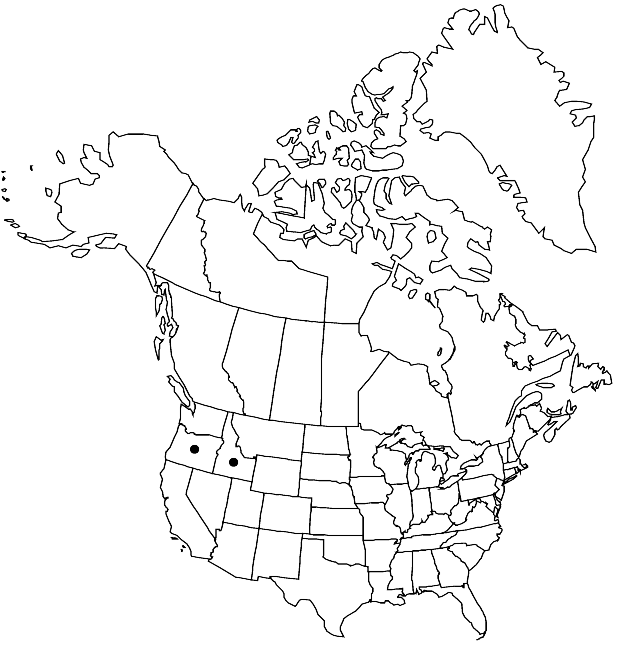Difference between revisions of "Stanleya confertiflora"
Fl. N.W. Amer., 59. 1897.
FNA>Volume Importer |
imported>Volume Importer |
||
| (6 intermediate revisions by 2 users not shown) | |||
| Line 7: | Line 7: | ||
|year=1897 | |year=1897 | ||
}} | }} | ||
| − | |basionyms={{Treatment/ID/ | + | |special_status={{Treatment/ID/Special_status |
| + | |code=E | ||
| + | |label=Endemic | ||
| + | }}{{Treatment/ID/Special_status | ||
| + | |code=C | ||
| + | |label=Conservation concern | ||
| + | }} | ||
| + | |basionyms={{Treatment/ID/Basionym | ||
|name=Stanleya viridiflora var. confertiflora | |name=Stanleya viridiflora var. confertiflora | ||
|authority=B. L. Robinson | |authority=B. L. Robinson | ||
| + | |rank=variety | ||
| + | |publication_title=in A. Gray et al., Syn. Fl. N. Amer. | ||
| + | |publication_place=1(1,1): 178. 1895 | ||
}} | }} | ||
|synonyms={{Treatment/ID/Synonym | |synonyms={{Treatment/ID/Synonym | ||
|name=Stanleya annua | |name=Stanleya annua | ||
|authority=M. E. Jones | |authority=M. E. Jones | ||
| − | }}{{Treatment/ID/Synonym | + | |rank=species |
| + | }} {{Treatment/ID/Synonym | ||
|name=Stanleya rara | |name=Stanleya rara | ||
|authority=A. Nelson | |authority=A. Nelson | ||
| + | |rank=species | ||
}} | }} | ||
|hierarchy=Brassicaceae;Brassicaceae tribe Thelypodieae;Stanleya;Stanleya confertiflora | |hierarchy=Brassicaceae;Brassicaceae tribe Thelypodieae;Stanleya;Stanleya confertiflora | ||
| Line 33: | Line 45: | ||
|distribution=Idaho;Oreg. | |distribution=Idaho;Oreg. | ||
|discussion=<p>Of conservation concern.</p><!-- | |discussion=<p>Of conservation concern.</p><!-- | ||
| − | --><p>Stanleya confertiflora is distributed in Gooding, Owyhee, and Washington counties in Idaho, and in Baker, Harney, and Malheur counties in Oregon.</p> | + | --><p><i>Stanleya confertiflora</i> is distributed in Gooding, Owyhee, and Washington counties in Idaho, and in Baker, Harney, and Malheur counties in Oregon.</p> |
|tables= | |tables= | ||
|references= | |references= | ||
| Line 42: | Line 54: | ||
-->{{#Taxon: | -->{{#Taxon: | ||
name=Stanleya confertiflora | name=Stanleya confertiflora | ||
| − | |||
|authority=(B. L. Robinson) Howell | |authority=(B. L. Robinson) Howell | ||
|rank=species | |rank=species | ||
| Line 56: | Line 67: | ||
|publication title=Fl. N.W. Amer., | |publication title=Fl. N.W. Amer., | ||
|publication year=1897 | |publication year=1897 | ||
| − | |special status= | + | |special status=Endemic;Conservation concern |
| − | |source xml=https:// | + | |source xml=https://bitbucket.org/aafc-mbb/fna-data-curation/src/2e0870ddd59836b60bcf96646a41e87ea5a5943a/coarse_grained_fna_xml/V7/V7_1200.xml |
|tribe=Brassicaceae tribe Thelypodieae | |tribe=Brassicaceae tribe Thelypodieae | ||
|genus=Stanleya | |genus=Stanleya | ||
Latest revision as of 22:30, 5 November 2020
Annuals or biennials; (glaucous), glabrous throughout. Stems erect, unbranched, (slightly ribbed), 2–6(–8) dm. Basal leaves (often withered by flowering); blade obovate to ovate, margins entire. Cauline leaves sessile; blade (fleshy), lanceolate, (2.2–)4–13(–16) cm × (5–)10–30(–40) mm, (smaller distally, base auriculate to sagittate), margins entire. Racemes dense, (slightly or not elongated in fruit). Fruiting pedicels horizontal to divaricate-ascending, 10–20(–26) mm. Flowers: sepals oblong-linear, 6–12 mm; petals yellow becoming whitish, narrowly linear to filiform, (12–)14–25 × 0.5–1.5 mm, (margins crisp), claw (nearly linear), 5–11 mm, slightly wider at base; filaments 12–17 mm; anthers 3–4.5 mm; gynophore (6–)10–18 mm. Fruits suberect to divaricate-ascending, slightly curved inward, (torulose), subterete, 2–5.2(–6) cm × 1.5–2.2 mm; ovules 40–62 per ovary; style 0.6–1.7 mm. Seeds oblong, 1.5–2.5 × 0.8–1 mm.
Phenology: Flowering Apr–Jun.
Habitat: Barren clay slopes in sagebrush communities, heavy clay flats, loose soil mounds, dry sandy grounds, alkaline meadows and flats
Elevation: 600-1500 m
Discussion
Of conservation concern.
Stanleya confertiflora is distributed in Gooding, Owyhee, and Washington counties in Idaho, and in Baker, Harney, and Malheur counties in Oregon.
Selected References
None.
